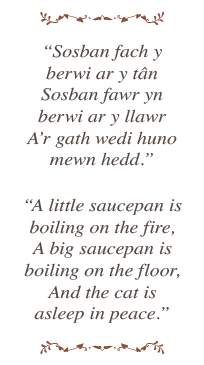During those childhood days in Wales, there was during the week, six eagerly anticipated visits to our street. Four of them food related; the cockleman, the baker’s van, the butcher’s van and of course the chimes of the ice cream man.
 The two non food related visit were that of the sound of the bell ringing of the rag and bone man, who would sharpen all your knives and scissors and then there was the arrival of what can only be described as a mobile market stall. A large flat bed truck, parked on the road at the bottom of a gully, that would sell (London market stall style) anything and everything. From stockings to kids clothing, from toys to kitchenware. All no doubt dodgy items, that had fallen off the back of another lorry. People would come from all the other streets around, assemble on the hillside and bid or buy for what they wanted.
The two non food related visit were that of the sound of the bell ringing of the rag and bone man, who would sharpen all your knives and scissors and then there was the arrival of what can only be described as a mobile market stall. A large flat bed truck, parked on the road at the bottom of a gully, that would sell (London market stall style) anything and everything. From stockings to kids clothing, from toys to kitchenware. All no doubt dodgy items, that had fallen off the back of another lorry. People would come from all the other streets around, assemble on the hillside and bid or buy for what they wanted.The first of the food related visits was that of the cockle man. A small white van as I remember, that would come selling freshly cooked seafoods gathered that day from the rich seafood beds of Wales. I don't know where exactly they came from, but I always imagined it to be from Porthcawl. Probably because that’s where we holidayed, and I just associated seafood with the only seaside I really knew.
It wasn’t a common treat, we didnt get them every week. But just once in a while I was bought a small paper bag of juicy, succulent, sweet cockles. The bag always ending up being soaked through with either the cockles own juices, or from the copious amounts of salt, pepper and vinegar that we would put on them. I love all manner of seafood now, and have eaten just about everything there is. Maine lobster is fine, French oysters are ok, moules mariniere are all well and good, Cornish crab might be luxurious and delicious, but cockles still have to rate as numeral uno.

We only ever had them as I remember off the van, and only ever ate them straight from the bag but these days I do love to do so much more with them. Cockles are similar to the New Zealand pipis (pip-ees) and tuatua (two-ah-two-ah) which make great fritters, but for me Welsh cockle soup has the edge. A big bowl of that with a good crusty bread on a cold day for lunch, really will warm the cockles of your heart. This is my version of a Welsh classic, cawl cocos, which is similar to the American Boston Clam Chowder
recipe - welsh cockle soup
500 gm cockle flesh
050 gm butter
025 gm flour
001 pc carrot
001 pc onion (small)
001 pc celery stalk
002 pc potatoes (medium sized)
100 lt light chicken stock
100 ml double cream
preparation method
Finely chop the vegetables or blitz in a food processor (do not puree) and cut the peeled potatoes into small dice. Melt the butter over a low heat, in a thick bottomed saucepan, add the vegetables and cook gently until slightly softened, add the potato and flour and cook gently for a few minutes. Slowly add the stock, stirring constantly until a slightly thickened, lump free consistency is achieved. Add the cockles and simmer gently for 15 minutes, ensuring it is stirred frequently to prevent the cockles sinking and sticking and burning to the base. Taste and season as required, finish with the cream.
025 gm flour
001 pc carrot
001 pc onion (small)
001 pc celery stalk
002 pc potatoes (medium sized)
100 lt light chicken stock
100 ml double cream
preparation method
Finely chop the vegetables or blitz in a food processor (do not puree) and cut the peeled potatoes into small dice. Melt the butter over a low heat, in a thick bottomed saucepan, add the vegetables and cook gently until slightly softened, add the potato and flour and cook gently for a few minutes. Slowly add the stock, stirring constantly until a slightly thickened, lump free consistency is achieved. Add the cockles and simmer gently for 15 minutes, ensuring it is stirred frequently to prevent the cockles sinking and sticking and burning to the base. Taste and season as required, finish with the cream.
No comments:
Post a Comment